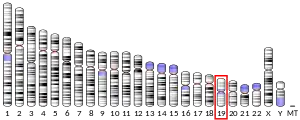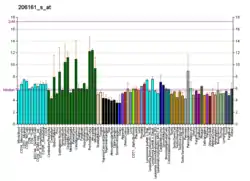SYT5
Synaptotagmin-5 is a protein that in humans is encoded by the SYT5 gene.[4][5]
References
- GRCh38: Ensembl release 89: ENSG00000129990 - Ensembl, May 2017
- "Human PubMed Reference:". National Center for Biotechnology Information, U.S. National Library of Medicine.
- "Mouse PubMed Reference:". National Center for Biotechnology Information, U.S. National Library of Medicine.
- Craxton M, Olsen A, Goedert M (Jul 1997). "Human synaptotagmin V (SYT5): sequence, genomic structure, and chromosomal location". Genomics. 42 (1): 165–9. doi:10.1006/geno.1997.4722. PMID 9177789.
- "Entrez Gene: SYT5 synaptotagmin V".
Further reading
- Hudson AW, Birnbaum MJ (1995). "Identification of a nonneuronal isoform of synaptotagmin". Proc. Natl. Acad. Sci. U.S.A. 92 (13): 5895–9. doi:10.1073/pnas.92.13.5895. PMC 41608. PMID 7597049.
- Perin MS (1996). "Mirror image motifs mediate the interaction of the COOH terminus of multiple synaptotagmins with the neurexins and calmodulin". Biochemistry. 35 (43): 13808–16. doi:10.1021/bi960853x. PMID 8901523.
- Fukuda M, Kanno E, Mikoshiba K (1999). "Conserved N-terminal cysteine motif is essential for homo- and heterodimer formation of synaptotagmins III, V, VI, and X." J. Biol. Chem. 274 (44): 31421–7. doi:10.1074/jbc.274.44.31421. PMID 10531343.
- Craxton M, Goedert M (1999). "Alternative splicing of synaptotagmins involving transmembrane exon skipping". FEBS Lett. 460 (3): 417–22. doi:10.1016/S0014-5793(99)01382-4. PMID 10556508. S2CID 19207631.
- Mizutani A, Fukuda M, Ibata K, et al. (2000). "SYNCRIP, a cytoplasmic counterpart of heterogeneous nuclear ribonucleoprotein R, interacts with ubiquitous synaptotagmin isoforms". J. Biol. Chem. 275 (13): 9823–31. doi:10.1074/jbc.275.13.9823. PMID 10734137.
- Strausberg RL, Feingold EA, Grouse LH, et al. (2003). "Generation and initial analysis of more than 15,000 full-length human and mouse cDNA sequences". Proc. Natl. Acad. Sci. U.S.A. 99 (26): 16899–903. doi:10.1073/pnas.242603899. PMC 139241. PMID 12477932.
- Ota T, Suzuki Y, Nishikawa T, et al. (2004). "Complete sequencing and characterization of 21,243 full-length human cDNAs". Nat. Genet. 36 (1): 40–5. doi:10.1038/ng1285. PMID 14702039.
- Gerhard DS, Wagner L, Feingold EA, et al. (2004). "The status, quality, and expansion of the NIH full-length cDNA project: the Mammalian Gene Collection (MGC)". Genome Res. 14 (10B): 2121–7. doi:10.1101/gr.2596504. PMC 528928. PMID 15489334.
- Sreenath AS, Kumar KR, Reddy GV, et al. (2005). "Evidence for the association of synaptotagmin with glutathione S-transferases: implications for a novel function in human breast cancer". Clin. Biochem. 38 (5): 436–43. doi:10.1016/j.clinbiochem.2005.01.009. PMID 15820774.
- Kimura K, Wakamatsu A, Suzuki Y, et al. (2006). "Diversification of transcriptional modulation: large-scale identification and characterization of putative alternative promoters of human genes". Genome Res. 16 (1): 55–65. doi:10.1101/gr.4039406. PMC 1356129. PMID 16344560.
This article is issued from Wikipedia. The text is licensed under Creative Commons - Attribution - Sharealike. Additional terms may apply for the media files.



